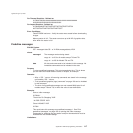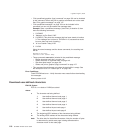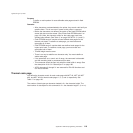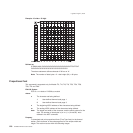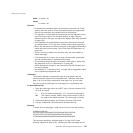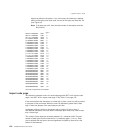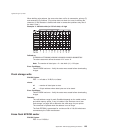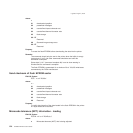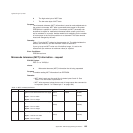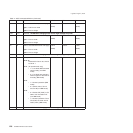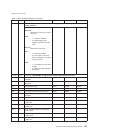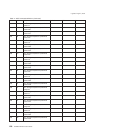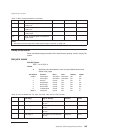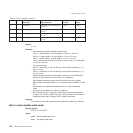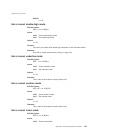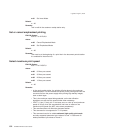
h The high-order byte of MCT data
l The low-order byte of MCT data
Purpose:
The microcode tolerance (MCT) information is used to make adjustments to
the printer’s microcode. MCT data is nonvolatile data stored in the printer
EPROM that is specific to a printer. For example, an MCT parameter can
be defined to adjust for mechanical tolerances which cause a print line to
not be centered on a receipt. Another would be for adjusting for the number
of motor steps to the first print position on a document. This data remains
intact until changed by the user.
Remarks:
Table 17 lists the MCT values by the parameter (n). The table includes the
default, the minimum, and the maximum values of each MCT.
If you try to set an MCT value out of its defined range, it is set to the
closest limit (the minimum or maximum value) or rejected.
Error Conditions:
EPROM load error
Microcode tolerance (MCT) information - request
EIA-232 Syntax:
ESC S n or X'1B;53;n'
where:
n Microcode tolerance (MCT) information that is being requested
Purpose:
To enable reading MCT information from EEPROM.
Remarks:
v MCT data is sent over the serial line in status bytes 9 and 10. See
Table 17 for the values of parameter n.
v MCT write command values that are out of range cause the command to
be rejected. (See bit 7 of “Status byte 1” on page 184.)
Table 17. MCT command definitions
DEC HEX MCT Default Min Max
2 2 Matrix of user-defined thermal code page
1
Byte 1: Dot row width
Byte 2: Dot row height
X'0A14'
(10x20)
X'0810' X'1020'
(16x32)
3 3 Matrix of user-defined thermal code page
2
Byte 1: Dot row width
Byte 2: Dot row height
X'0A14'
(10x20)
X'0810' X'1020'
(16x32)
4 4 Matrix of user-defined impact code page
1
Byte 1: Half-dot row width
Byte 2: Dot row height
X'0707'
(07x07)
X'0404' X'1010'
(16x16)
Updated April 2, 2009
Appendix D. EIA-232 programming information 125



